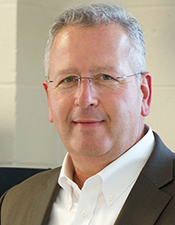"Maker Movement" Pioneer Joseph DeSimone Wins Carnegie Mellon's Dickson Prize in Science
His Lecture on "Breakthroughs in Imprint Lithography and 3-D Additive Fabrication" Will Be Feb. 16
By Jocelyn Duffy / 412-268-9982
 Carnegie Mellon University has awarded its 2014 Dickson Prize in Science to Joseph M. DeSimone, a chemist and chemical engineer on the faculties of the University of North Carolina at Chapel Hill and North Carolina State University. DeSimone is best known for his contributions to the "Maker Movement," having developed two techniques for the rapid prototyping of vehicles for drug delivery.
Carnegie Mellon University has awarded its 2014 Dickson Prize in Science to Joseph M. DeSimone, a chemist and chemical engineer on the faculties of the University of North Carolina at Chapel Hill and North Carolina State University. DeSimone is best known for his contributions to the "Maker Movement," having developed two techniques for the rapid prototyping of vehicles for drug delivery.
CMU's Dickson Prize in Science was established in 1969 by the late Pittsburgh physician Joseph Z. Dickson, and his wife Agnes Fisher Dickson. It is awarded annually to individuals in the United States who make outstanding contributions to science.
DeSimone will accept the award, which includes a medal and cash prize, and present the Dickson Prize Lecture at 4:30 p.m., Monday, Feb. 16 in McConomy Auditorium on the first floor of CMU's Cohon University Center. His lecture, "Breakthroughs in Imprint Lithography and 3-D Additive Fabrication," is free and open to the public.
The Maker Movement is defined by a do-it-yourself culture that seeks to create new things. In science, the movement has been propelled by the development of low-cost and high-throughput manufacturing tools. DeSimone has invented two such tools for the creation of new technologies for drug delivery: Particle Replication in Non-wetting Templates (PRINT), an off-shoot of imprint lithography that can be used to mold individual drug particles and drug delivery vehicles, and Continuous Liquid Interface Printing (CLIP), a pioneering advance in 3-D additive manufacturing.
DeSimone is the Chancellor's Eminent Professor of Chemistry at the University of North Carolina at Chapel Hill, the William R. Kenan, Jr. Distinguished Professor of Chemical Engineering at North Carolina State University, and an adjunct faculty member at Memorial Sloan-Kettering Cancer Center. He is presently serving as the CEO of Carbon3D in Silicon Valley.
DeSimone, like CMU President Subra Suresh, is one of only a few individuals who have been elected to all three of the National Academies: the Institute of Medicine, the National Academy of Sciences and the National Academy of Engineering. He has received more than 50 major awards and honors for his work, including the Lemelson-MIT Prize for Invention and Innovation, the NIH Director's Pioneer Award and the American Chemical Society Award for Creative Innovation.
DeSimone has published more than 300 scientific articles, and holds more than 150 patents, with over 80 additional patents pending. He has co-founded several companies including Micell Technologies, Biostent, Liquidia Technologies and Carbon3D.
###